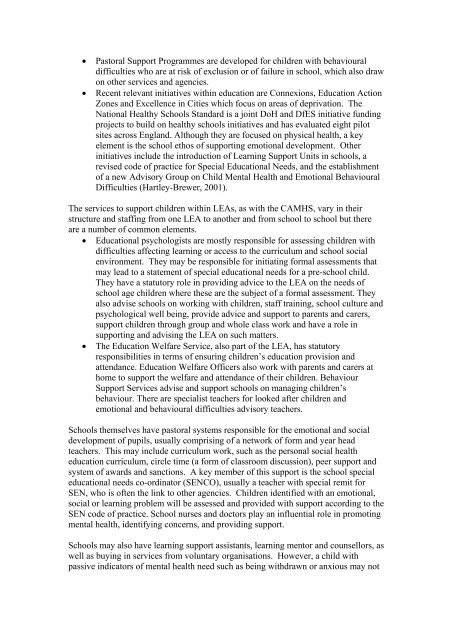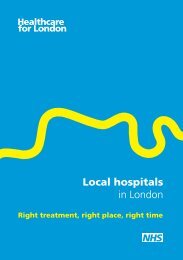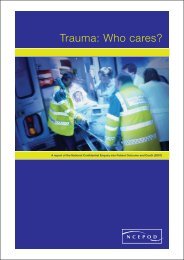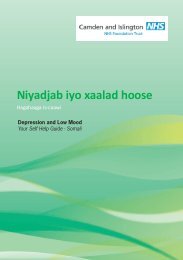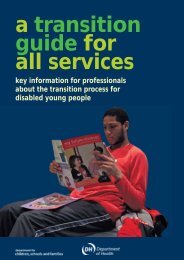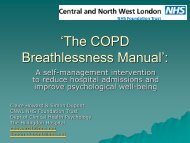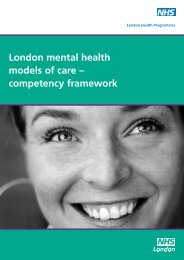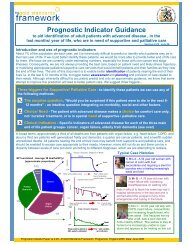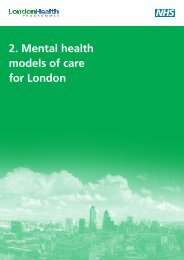(CAMHS) and Schools - London Health Programmes
(CAMHS) and Schools - London Health Programmes
(CAMHS) and Schools - London Health Programmes
You also want an ePaper? Increase the reach of your titles
YUMPU automatically turns print PDFs into web optimized ePapers that Google loves.
• Pastoral Support <strong>Programmes</strong> are developed for children with behavioural<br />
difficulties who are at risk of exclusion or of failure in school, which also draw<br />
on other services <strong>and</strong> agencies.<br />
• Recent relevant initiatives within education are Connexions, Education Action<br />
Zones <strong>and</strong> Excellence in Cities which focus on areas of deprivation. The<br />
National <strong>Health</strong>y <strong>Schools</strong> St<strong>and</strong>ard is a joint DoH <strong>and</strong> DfES initiative funding<br />
projects to build on healthy schools initiatives <strong>and</strong> has evaluated eight pilot<br />
sites across Engl<strong>and</strong>. Although they are focused on physical health, a key<br />
element is the school ethos of supporting emotional development. Other<br />
initiatives include the introduction of Learning Support Units in schools, a<br />
revised code of practice for Special Educational Needs, <strong>and</strong> the establishment<br />
of a new Advisory Group on Child Mental <strong>Health</strong> <strong>and</strong> Emotional Behavioural<br />
Difficulties (Hartley-Brewer, 2001).<br />
The services to support children within LEAs, as with the <strong>CAMHS</strong>, vary in their<br />
structure <strong>and</strong> staffing from one LEA to another <strong>and</strong> from school to school but there<br />
are a number of common elements.<br />
• Educational psychologists are mostly responsible for assessing children with<br />
difficulties affecting learning or access to the curriculum <strong>and</strong> school social<br />
environment. They may be responsible for initiating formal assessments that<br />
may lead to a statement of special educational needs for a pre-school child.<br />
They have a statutory role in providing advice to the LEA on the needs of<br />
school age children where these are the subject of a formal assessment. They<br />
also advise schools on working with children, staff training, school culture <strong>and</strong><br />
psychological well being, provide advice <strong>and</strong> support to parents <strong>and</strong> carers,<br />
support children through group <strong>and</strong> whole class work <strong>and</strong> have a role in<br />
supporting <strong>and</strong> advising the LEA on such matters.<br />
• The Education Welfare Service, also part of the LEA, has statutory<br />
responsibilities in terms of ensuring children’s education provision <strong>and</strong><br />
attendance. Education Welfare Officers also work with parents <strong>and</strong> carers at<br />
home to support the welfare <strong>and</strong> attendance of their children. Behaviour<br />
Support Services advise <strong>and</strong> support schools on managing children’s<br />
behaviour. There are specialist teachers for looked after children <strong>and</strong><br />
emotional <strong>and</strong> behavioural difficulties advisory teachers.<br />
<strong>Schools</strong> themselves have pastoral systems responsible for the emotional <strong>and</strong> social<br />
development of pupils, usually comprising of a network of form <strong>and</strong> year head<br />
teachers. This may include curriculum work, such as the personal social health<br />
education curriculum, circle time (a form of classroom discussion), peer support <strong>and</strong><br />
system of awards <strong>and</strong> sanctions. A key member of this support is the school special<br />
educational needs co-ordinator (SENCO), usually a teacher with special remit for<br />
SEN, who is often the link to other agencies. Children identified with an emotional,<br />
social or learning problem will be assessed <strong>and</strong> provided with support according to the<br />
SEN code of practice. School nurses <strong>and</strong> doctors play an influential role in promoting<br />
mental health, identifying concerns, <strong>and</strong> providing support.<br />
<strong>Schools</strong> may also have learning support assistants, learning mentor <strong>and</strong> counsellors, as<br />
well as buying in services from voluntary organisations. However, a child with<br />
passive indicators of mental health need such as being withdrawn or anxious may not


